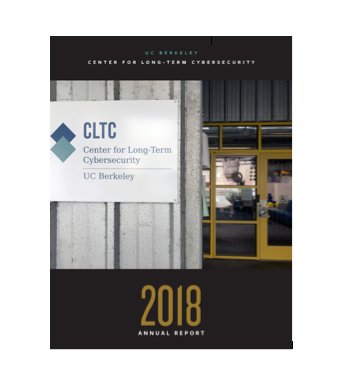
The CLTC 2018 Annual Report highlights many of the Center for Long-Term Cybersecurity’s achievements from the year 2018, a year that saw the launch of Citizen Clinic, the world’s first public-interest cybersecurity clinic, as well as a year-long collaboration with the World Economic Forum focused on the future of cybersecurity.
“After four years in operation, CLTC is at an exciting inflection point: we are no longer a start-up, and can now point to several mature programs,” wrote Steven Weber, Faculty Director, and Ann Cleaveland, Executive Director, in a letter introducing the report. “In 2018, we deepened and extended our work at the human-technology nexus with new partners, in new geographies, and on new issue-areas that we believe benefit from longer-term perspectives on how to preserve and extend the promise of digital technologies to improve the human experience.”
Among the programs and achievements highlighted in the report:
- We funded 39 different research initiatives led by Berkeley faculty, students, and researchers, including projects tackling important issues like improving the cybersecurity of local governments; protecting vulnerable individuals and organizations from state surveillance; defending against social engineering attacks; understanding the security implications of 5G networks; and developing secure contracts through blockchain.
- Following more than a year of preparation, we launched Citizen Clinic, a first-of-its-kind public interest cybersecurity program that provides pro bono services to politically vulnerable individuals or organizations that are at risk of cyberattack. Citizen Clinic is based on a clinical model (similar to a law or medical clinic), in which students work with real-world clients and have a unique opportunity for experiential learning.
- Together with the World Economic Forum’s Global Centre for Cybersecurity (C4C) and CNA’s Institute for Public Research, we brought four alternate future scenarios to seven international workshops around the world —including Palo Alto, Munich, Singapore, Hong Kong, Moscow, Geneva, and Washington, DC—to compare how people and organizations in different parts of the world assess the trade-offs around a range of emerging cybersecurity issues. Our report, “Cybersecurity Futures 2025: Insights and Findings,” was released at the annual meeting of the C4C in Geneva in November.
- We continued our series of ‘white papers,’ publishing three reports authored by CLTC staff and grantees, including Cyber Operations in Conflict: Lessons from Analytic Wargames, Privacy and the Internet of Things: Emerging Frameworks for Policy and Design, and Defending Politically Vulnerable Organizations Online.
- We continued to help expand the depth and reach of UC Berkeley’s Master of Information and Cybersecurity (MICS) degree program at the School of Information, which is delivered fully online and welcomed its first cohort in 2018.
- CLTC created diverse opportunities for sharing and learning about cybersecurity: we organized the second annual Research Exchange, a day-long showcase of our grantees’ research, and we continued our Seminar Series, which featured interactive presentations by UC Berkeley faculty members and outside experts on important topics such as big data and surveillance, adversarial machine learning, and complexity and security.
- We grew our in-house research capacity, ending the year with five full-time-equivalent researchers on staff. We also hosted a group of outstanding visiting scholars from outside institutions, whose work addresses topics such as internet governance, machine learning, and the economics of security.
- CLTC and our grantees received coverage in dozens of media outlets in 2018, including the New York Times, Financial Times, Washington Post, USA Today, The Hill, Axios, Quartz, Cyber Scoop, VICE’s Motherboard, and other outlets.
- We built partnerships with an array of outside institutions, including corporations. We partnered with Microsoft to sponsor a workshop and research initiative focused on cyberattack attribution, and we welcomed three new companies—HP Inc., Microsoft, and T-Mobile—as members of the CLTC Corporate Membership Program.
“We are entering 2019 eager to build on our successes, deepen our impact, and cultivate the financial base needed to sustain CLTC’s mission,” Weber and Cleaveland wrote. “We repeatedly see our most effective work emerging from the application of broad competencies and unique perspectives to the cybersecurity problem set. We look forward to amplifying and expanding this important work in 2019.”

